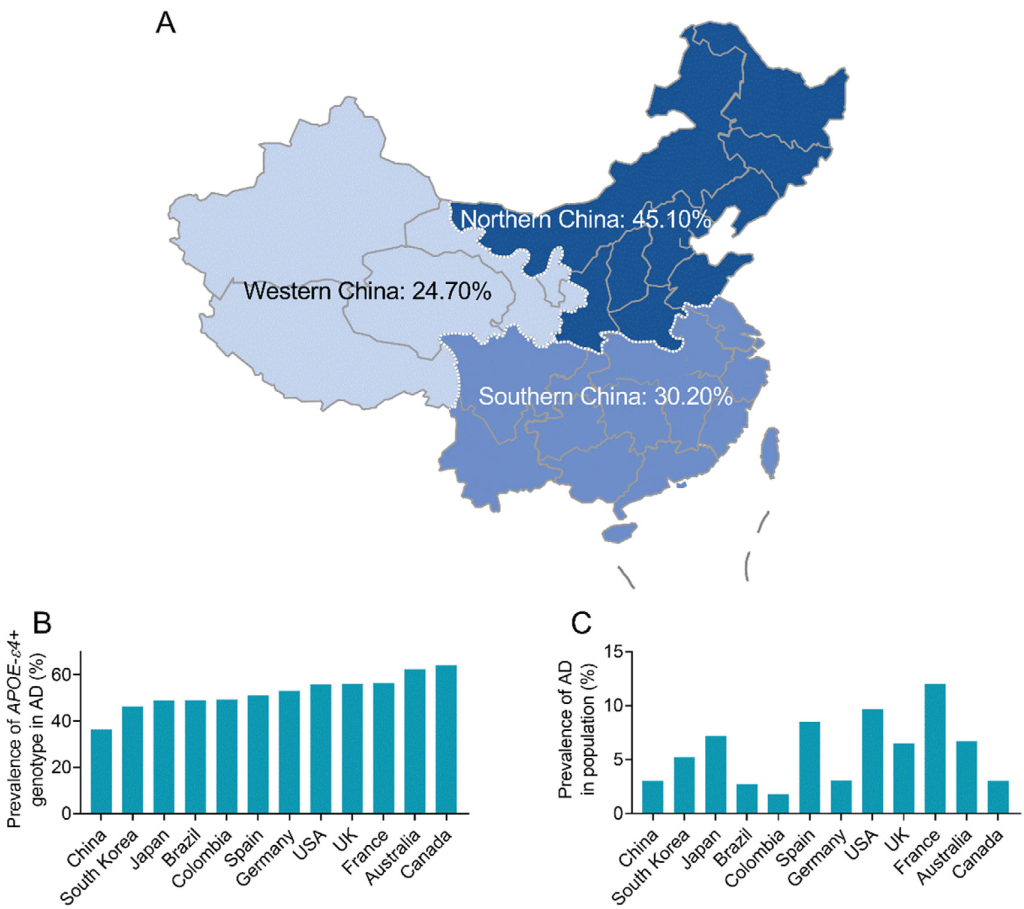The first international report on the distribution and role of the Alzheimer’s disease risk gene APOEε4 in 15119 cases of Chinese population provides strong evidence for genetic counseling and precise intervention.
In September 2020, the team of Professor Jianping Jia from Xuanwu Hospital of Capital Medical University published an online work entitled “The APOE-ε4 exerts differential effects on familial and other subtypes of Alzheimer’s disease” in the journal Alzheimer’s & Dementia (IF:17.127). This study is the first to analyze the carrying status of apolipoprotein E4 in Chinese people. 15119 people from more than 30 provinces across the country have done APOE genotype testing and analysis, which confirms the strong association between APOE ε4 and Alzheimer’s disease(AD) . At the same time, it is revealed that APOE ε4 alleles have different risk effects in the three AD subtypes, especially in familial AD with unknown gene mutations. Approximately 20% of normal Chinese people carry the APOE ε4 genotype, and APOE ε4 is considered to be the main genetic risk factor. The findings of this study provide a theoretical basis for establishing large-scale population intervention. The first author of the article is Longfei Jia , deputy chief physician of Xuanwu Hospital of Capital Medical University, and the corresponding author is Professor Jianping Jia.

A total of 15119 subjects were enrolled in this study, including normal people, familial AD with known gene mutations, sporadic AD, and familial AD with unknown gene mutations. The frequency distribution of APOE ε4 genotype showed an increasing trend, respectively 19.54 %, 26.19%, 36.23%, 56.27%. According to the risk prediction model established by APOE ε4, APOE ε4 has no risk effect on familial AD with known gene mutations, but has the strongest risk prediction ability for familial AD with unknown gene mutations. APOE ε4 genotype may cause unknowns gene mutation is one of the main causes of familial AD, which explains a large number of risk genes in such families, and provides a theoretical basis for precise intervention in the future.

This study reports the effectiveness of APOE ε4 in predicting the risk of different subtypes of AD,which is the largest multicenter study on the frequency distribution of APOE in the Chinese population so far. The results of the study have gradually revealed the mystery of APOE ε4’s regulation of AD prevalence, which has had an important impact on the international understanding of the pathogenesis of APOE ε4 in the Chinese population, and also provided new ideas for AD genetic intervention and gene therapy in Chinese . It is expected to start with gene editing, reduce the expression of AD risk genes, and find a new breakthrough point for the ultimate cure of AD.
This study was supported by the Key Project of the National
Natural Science Foundation of China (81530036); the National
Key Scientific Instrument and Equipment Development Project
(31627803); Mission Program of Beijing Municipal Administration of Hospitals (SML20150801); Beijing Scholars Program; Beijing Brain Initiative from Beijing Municipal Science & Technology Commission (Z161100000216137); Project for Outstanding Doctor with Combined Ability of Western and Chinese Medicine; and Beijing Municipal Commission of Health and Family Planning(PXM2019_026283_000003) .
